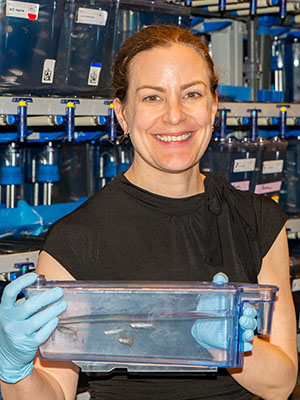
Lavinia Sheets, PhD
Principal Investigator
Mentoring Philosophy:
My mentoring philosophy is centered on open communication, mutual respect, scientific rigor, and professional growth.
One of my primary goals as a mentor is to help trainees leverage and expand their strengths while also identifying areas in need of growth and improvement. I understand that each trainee has unique learning styles and preferences, and I am committed to being flexible in my approach and tailoring my mentoring strategies to meet the diverse needs of individual lab members. I also strive to help trainees plan their next professional destination (Academia? Industry? Policy? Something else?) and adapt their training plan accordingly.
In practice, I meet with trainees and lab staff as a group once a week, as well as weekly scheduled one-on-one meetings to discuss research progress, experimental strategies, publication planning, and anything else they need to discuss. I also work together with each trainee to create an Individual Development Plan and go over it with them quarterly to ensure we successfully link individual career interests with the lab’s research priorities.
I strongly believe in empowering lab trainees to take ownership of their projects and research endeavors. While providing guidance and structure, I encourage independence and innovation in directing their own projects with the aim of supporting creativity, critical thinking, and a sense of ownership in their work.
Collaboration and camaraderie are essential elements of my research group. As a mentor, I foster an ethos of teamwork, where lab members support and learn from one another. By encouraging cooperation, I believe we can capitalize on our collective expertise and diverse perspectives to tackle scientific challenges more effectively.
My lab welcomes and supports lab members from diverse identities, backgrounds, and abilities, and is committed to a sustaining an inclusive environment.
Finally, I value work/life balance and aim to create an environment that supports scientific excellence while maintaining an active life (social, family, hobbies) outside of the lab.
Bio:
Lavinia is a Portland Oregon native that lived on both coasts of the United States before settling in St Louis. She received a B.S. in Biology from Pacific University with a minor in Music and was briefly a member of the Portland Opera Chorus before entering the Neuroscience Graduate Program at Oregon Health & Science University. At OHSU, Lavinia studied intracellular transport regulation in the lab of Bruce Schnapp. Her graduate training was supplemented with occasional trips to Eugene Oregon where the zebrafish labs at the Institute of Neuroscience would allow her to observe, learn genetic and screening techniques, and share their coffee cake. She also received invaluable mentoring and support from Stephen Johnson, whom she briefly overlapped with at WUSTL many years later.
Lavinia continued to train at OHSU in the lab of Teresa Nicolson, where she was first introduced to zebrafish as a model for hearing and deafness. In Teresa’s lab, Lavinia’s research focused on how hair cells develop and maintain their synaptic connections with afferent nerves. At Mass Eye and Ear’s Eaton Peabody Laboratories, where Lavinia was the inaugural Amelia Peabody Fellow, Lavinia’s research shifted from hair-cell organ development to damage and repair. Since 2017, Lavinia continues this research with her lab team as an Assistant Professor with the Department of Otolaryngology at WUSTL.